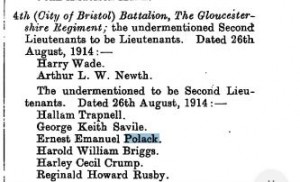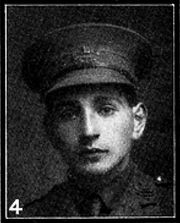The Somme Remembered – 17th July 1916
Londsdale Cemetery, Authuille, is the final resting place of Lieutenant Ernest Emanuel Polack, who was aged 23 when he was killed.
Who was Ernest?
Ernest was born on the 25th of February 1893, in Clifton, the youngest son of Joseph Polack and his wife Sophia nee Isaac. Joseph was the headmaster of Jewish Boarding House at Clifton College. .
1901 saw the family living at 1 Percival Road, where Joseph was listed as Headmaster and Jewish Minister with his wife and two sons – Albert I and Ernest E, both 8 years old. Also listed at that address was George W Palmer a Schoolmaster and numerous students.
Ten years later life is carrying on for the family. Joseph is still Headmaster, but now his eldest son Benjamin James, aged 20 is home, as are Albert Isaac and Ernest Emanuel both aged 18 – could they be twins? Also in the house are Reginald Charles Fawdry, Joseph’s assistant, John William Searle, butler plus other servants, followed on by numerous students. The 1911 also tells that Joseph and Sophia had been married 24 years with Sophia giving birth to four children With only three children living to be included in the census – little did she know what would happen in five years time.
Ernest was educated at Clifton followed by St John’s College, Cambridge, where he earned a scholarship in Semitic languages. He was a frequent speaker at the Union and was elected a member of the committee. Both at Clifton and Cambridge he was a member of the OTC (officer training corps).
 His military life continued when he was commissioned in August of 1914 in the 4th Battalion of the Gloucester Regiment. By April the following year he was with his regiment on the Western Front, stationed at Ploegsteert Wood.
His military life continued when he was commissioned in August of 1914 in the 4th Battalion of the Gloucester Regiment. By April the following year he was with his regiment on the Western Front, stationed at Ploegsteert Wood.
Just before the Battle of the Somme began, Ernest wrote a letter to his parents which tells that he feels that when the Advance will begin on the 1st of July, he realises he may not survive the days ahead and carries morphia in case of injury as the prospect of pain is somewhat abhorrent to him, but the thought of death does not worry him. He goes on to tell that he is held in reserve at Hebuterne (known to the soldiers as About Turn) and it all goes well he and his men would not be needed until the next night and will then be resisting an attack somewhere near Beaumont-Hamel. Further reading gives details of who was to receive his Shakespeare books, who was to receive his Dickens and that his aunts and uncles should also receive some of his effects, with one request going to Great Ormond Street Hospital where one of his friends died……‘To you – Mother and Father – I owe all. The thought of you two – and of my brothers – will inspire me to the end. I often wish Albert was with me and I miss him dreadfully. Good-bye! “If we shall meet again, why then we’ll smile. If not – why then this parting was well made” (Julius Caesar). Your loving son, Ernest. (I will ask Mr Ramsay (our Chaplain) to send you this if I fall.)‘ The letter and one other wrote by Ernest have been published in a book by Laurence Weaver – ‘War Letters of Fallen Englishmen’
The battalion were not called forward as expected, they were infact sent for training. On the morning of the 16th of July the order was given to move forward into Ovillers and took the German lines. Over the next two days the fighting continued and advanced to just north of the village. It was during this fighting that Ernest and fellow officer Lt. A D Anderson were killed.
Lt Ernest Emanuel Polack was recovered from the battlefield – according to sources was either during the spring of the following year after the German withdrawal or after the Armistice when those who had died for their country were brought in from the surrounding battlefields.
The medal card for Ernest tells, his date from which he was eligible for various medals, his date of death with the word ‘died’ before the date. His regiment, ranks and his father’s address. While, monies due from the War Office to Ernest were sent to Cox and Co. via transfer 509. Cox and Co., seem to have been mentioned in a great number of entries in the Register of Soldiers’ Effects which are available from Ancestry pay per view.
Ernest is remembered in The Cross of Sacrifice – Officers who died in the Service of British, Indian and East African Regiments and Corps 1914 – 1919 compiled by S D and D B Jarvis.
2nd Lieutenant Benjamin Polak of the 9th Worcestershire Regiment, Ernest’s elder brother, was killed in action in Mesopotamia on the 9th of April 1916 aged 26.
Albert, the surviving child of Joseph and Sophia Polack followed his father into education.
